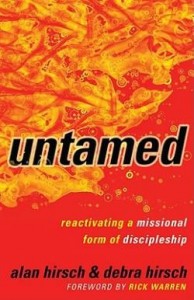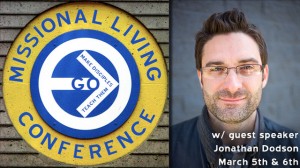My sermon prep begins with me, a cup of coffee, and my Bible. Only the coffee is optional. While I know my Bible well enough to have an opinion on a given text’s meaning and how it fits into the overall story of the Bible, I like to focus and pray through specific words and phrases in the passage. This helps me “steep,” or soak in the text so I can encounter God through the text. – Darrin Patrick
Missional Living Conference A/V
Redeemer Church recently invited me to speak at their Missional Living Conference. The conference was built around the Three Gospel Conversions based on Colossians 1:15-20. Those familiar with my talks at LEAD ’09 will note that these new talks introduce a fresh theological and practical perspective on the Three Conversions. Each talk has both Audio and Video.
Conversion to Christ: This message deconstructs the dualism of American Christianity in order to reconstruct a whole Gospel around Jesus Christ as Lord.
Conversion to Church: This message demonstrates the communal character of the Gospel, unpacking very practical ways to cultivate “steady state community.”
Conversion to Mission: This message shows how mission is not optional but essential, and spends considerable time talking about how to live “everyday life with gospel intentionality.”
Bonus Sermon on What Kind of Church Renews a City?
Review: Untamed, Hirsch (pt 2)
This is part two of my book review of Alan and Deb Hirsch’s book Untamed: reactivating missional discipleship. See part one.
God-centered Discipleship
Given the age of programs, systems, and missional techniques, it was very refreshing to see the Hirsch’s start off with a profound theological focus. Chapter Two lays a God-centered foundation for discipleship by explaining the difference between a healthy and a sick disciple. The Hirsches set the tone by saying: “A book on missional discipleship must first get the basics right in relation to God.” They make it clear that missional discipleship isn’t about being trendy or socially active; it’s fundamentally about worshiping God. They write:“If we are going to be missional disciples then we need to put our best efforts into knowing God, into the pursuit of the Holy.”
Shema Spirituality (holistic discipleship)

The problem with every disciple is that we worship things and persons other than God. Drawing on Lewis’ distinction between ordinate and inordinate love, they point out that the sick disciple is one who inordinately loves anything other than God (very Augustinian). A distinction is made between idol worship and worship of the one, true God, what they call Shema Spirituality. No, it’s not Eastern mysticism, it’s based on the Great Shema of Deuteronomy 6 which tells us to love the Lord our God with all our heart, soul, and mind. “Discipleship is loving God first and foremost, and then loving everything else in light of that love.”
True discipleship involves a right knowing of God, and right knowing includes feeling, thinking, and acting. Mature disciples grow in all three areas. They note that these ways of loving God are more natural to some than others. In fact, each way of Shema spirituality tends to align with certain spiritual leaders: Pastor (feeling), Activist (acting), and Theologian (thinking). Each of these types of leaders need to spend time with one another for mature discipleship to come about. And all disciples need all three types of people in their lives.
Reflect on your Discipleship
We do well to pause and consider where we need to grow as disciples—as theologians, pastors, or activists? Are there other Christians in your life that can “round you out” to foster a God-centered knowing and maturity in your discipleship? If so, ask them to lunch and explore ways you can grow together as disciples of Jesus. As with every chapter, the Hirsches provide helpful application points and questions for discussion.
Jonsi “Go” album of Sigur Ros
 Jonsi of Sigur Ros releases his first solo album “Go” tomorrow. You can stream it free now. Think of Sigur Ros but happier! 🙂
Jonsi of Sigur Ros releases his first solo album “Go” tomorrow. You can stream it free now. Think of Sigur Ros but happier! 🙂
What Critics Are Saying
replacing the abiding sense of melancholy you get from sigur ros albums with a child-like joyousness that dares you not to break out in a huge grin *****
-Â the times
a phenomenal record with almost every bar bursting with beauty. has ‘pop’ music ever sounded this wonderful?****1/2
-Â music omh
it does cartwheels when it bloody well feels like it, cries when it wants to, and raises the bar for song writers like sufjan stevens who share similarly heady classical predilections. 8/10
-Â paste magazine


